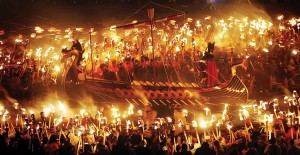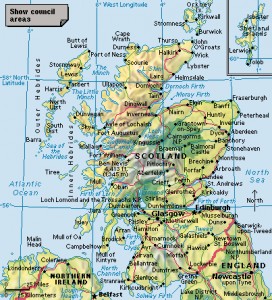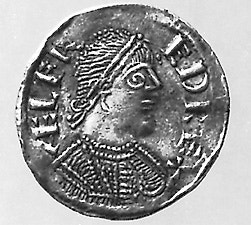The Vikings of Up Helly Aa
Wednesday, January 31st, 2018January 31, 2018
Yesterday, January 30, people in Lerwick, Scotland, celebrated an annual Viking festival known as Up Helly Aa. Up Helly Aa is a variant of the Scottish Gaelic word Uphaliday, meaning end of holiday. Traditionally, the festival marks the end of the Yuletide (Christmas season), and its origins go back to the days of Viking rule in the Shetland Islands, the northernmost part of the United Kingdom. The festival is famous for its torch-lit procession and the ceremonial burning of a traditional Viking long ship (warship), referred to here as a galley.

Guizers (actors who perform in traditional plays) surround a traditional Viking long ship in the Shetland town of Lerwick during the Up Helly Aa festival. Credit: © Danny Lawson, PA/AP Photo
Lerwick is the main port of the Shetland Islands. Vikings from Norway conquered the islands in the A.D. 800’s. Scotland acquired the islands in 1469, but much Viking culture and tradition remained. Celebrations similar to Up Helly Aa have taken place in Lerwick and other parts of the Shetlands for hundreds of years. In the 1870′s, the hazardous festival practice of rolling burning tar barrels down town streets was banned, and Lerwegians (the people of Lerwick) introduced the official Up Helly Aa soon after. The burning of tar barrels was replaced by a torch-lit procession, and in 1882, the first burning of a Viking galley.

Click to view larger image
Up Helly Aa takes place every January in Lerwick, the main port of Scotland’s far northern Shetland Islands. Credit: WORLD BOOK map
Up Helly Aa takes place every year on the last Tuesday of January. The holiday begins with a large breakfast and a march of some 1,000 guizers (actors who perform in traditional plays) in a variety of costumes led by the Guizer Jarl (chieftain) and his select “squad” of Vikings. The procession includes bands and a float carrying a Viking galley built by local tradespeople. Vikings pose for photos, and the town mayor officially gives possession of Lerwick to the Guizer Jarl. The Vikings visit the town’s schools, hospitals, senior citizen homes, and the Shetland Museum.
As night falls, a torch-lit procession illuminates the darkened but crowded streets of Lerwick. The guizers accompany the galley to the local King George V Park, where ceremonial rites precede the literal torching of the ship. After the flames die down, the guizers pass through a succession of halls (private parties) that host events such as dances, comedy acts, and music performances. Vikings and revelers also conquer and overflow local public establishments. The Wednesday after Up Helly Aa is a public holiday in Lerwick.
A competition of shop-window decorations accompanies the Viking festival each year, as does a Junior Up Helly Aa for boys complete with its own procession, galley, and galley burning. Women and girls participate in many Up Helly Aa activities, but they are not allowed to march in Lerwick’s official processions.



